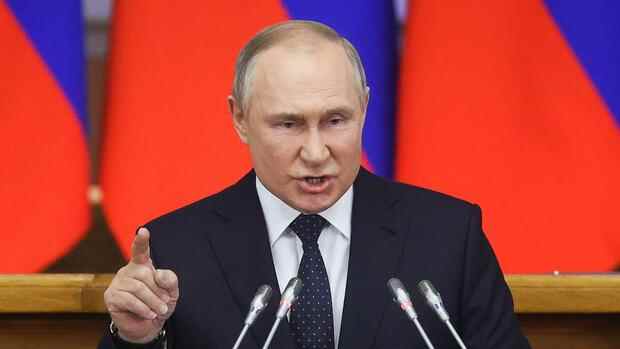Nor is anyone really surprised that the Russian president is willing to jeopardize the fate of his own economy.
Economists in this country have been arguing for weeks, and the federal government has been arguing about how high the economic costs are if something similar threatens Germany. Or in the event that the Federal Republic itself imposes a complete energy boycott in order to put pressure on the Putin system.
In the meantime, one has to say that it would be downright negligent not to prepare for such a scenario. Just because Putin could impose the embargo himself at any time, the economic costs for his country are still so high. Because the warlord in the Kremlin increasingly regards Germany as a war party.
In any case, the German position on the sanctions issue was never convincing. The new federal government only acted when international pressure became too great and there was no other choice. This applied to the stop of the Nord Stream 2 Baltic Sea pipeline. This applied to the delivery of defensive weapons. And that was especially true when it came to sanctions.
It is high time for a proactive signal from Berlin.
(Photo: dpa)
It is incomprehensible why Berlin still does not at least back an oil boycott, which would hit Putin hard and would be manageable from a European perspective.
It is high time for a proactive signal from Berlin. With the constantly hesitant attitude of its government, Germany has suffered an alarmingly high level of reputational damage – above all among its eastern partners, but increasingly also among its western partners on both sides of the Atlantic.
Yes, Putin has escalation dominance, as the saying goes. He and meanwhile also his foreign minister are constantly talking about the “third world war” and the “nuclear option”. Even the German Chancellor indirectly adopts this Kremlin rhetoric when he justifies his reluctance with the risk of a war between Russia and NATO.
Short-term shock is more benign than long-term effects of war
Nobody doubts that a gas boycott would cause great economic damage. It doesn’t matter which macroeconomic model and which economic modeler you use as a benchmark: it would be just as frivolous to trivialize the consequences as it would be to assume that Putin is not turning off the gas tap in his own interest.
And yet, in view of the historical impact of the events and the Russian war crimes, this economic debate seems almost petty, sometimes even self-righteous.
In the end, the question arises as to whether the short-term shock caused by a sudden gas freeze would be more harmless than the long-term effects should Putin prevail with his imperial policies.
A victory of any kind for Putin would be the signal to the autocrats of this world: wars of conquest can be worthwhile again. The decades of relative peace since the end of World War II would be over for good.
Vladimir Putin is willing to jeopardize his own economy if he cuts gas supplies.
(Photo: Kostas Koufogiorgos)
The war in Ukraine is ultimately a test of whether the West is willing to forego short-term maximization of prosperity for the sake of a larger goal. This price is still low compared to what the Ukrainians have to pay, who are also fighting for our freedom – as pathetic as that may sound.
Negligence in German corporate decisions
Incidentally, Germany’s contribution is also decided in the management floors of the companies. It is not enough, as BASF has done, to warn of the serious consequences of a gas supply freeze or even de-industrialization.
Quite a few top executives have relied on Nord Stream 2 and failed to diversify their energy sources. That was negligent. It is now part of their corporate responsibility to change course as quickly as possible.
In any case, it won’t work without renunciation. A chancellor who foments another illusion is acting irresponsibly. Likewise, by the way, like a chancellor who rules out a gas boycott from the outset.
More on the war in Ukraine and the consequences:
Because in this epoch-making conflict with Russia, what always applies applies: An order does not falter because of a rule violation, but only through the refusal to react decisively to the rule violation.
Who knows what Putin, the autocratic ruler of a kind of gas station with an attached nuclear arsenal, will think of next. Perhaps he remembers that Finland belonged to the Tsarist Empire until 1918.
More: The showdown – How Russia uses energy as a weapon
